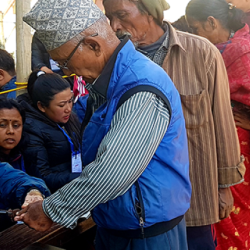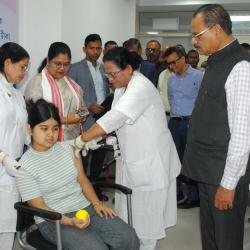More than 300 million people around the world have asthma, and the disease imposes a heavy burden on individuals, families, and societies.
The Global Burden of Asthma Report, indicates that asthma control often falls short and there are many barriers to asthma control around the world. Proper long-term management of asthma will permit most patients to achieve good control of their disease. Yet in many regions around the world, this goal is often not met.
Poor asthma control is also seen in the lifestyle limitations experienced by some people with asthma. For example, in some regions, up to one in four children with asthma is unable to attend school regularly because of poor asthma control. Asthma deaths are the ultimate, tragic evidence of uncontrolled asthma.
According to the Global Burden of Asthma Report, the majority of asthma deaths in some regions of the world are preventable. The theme of World Asthma Day 2008, an awareness-raising event organized by the Global Initiative for Asthma (GINA), is "You Can Control Your Asthma."
This theme emphasizes that effective asthma treatments exist and, with proper diagnosis, education, and treatment, the great majority of asthma patients can achieve and maintain good control of their disease. When asthma is under control, patients can live full and active lives.
According to the GINA Global Strategy for Asthma Management and Prevention (2007), asthma control means that a person with asthma has:
- No (or minimal) asthma symptoms - No waking at night due to asthma
- No (or minimal) need to use "reliever" medication
- The ability to do normal physical activity and exercise
- Normal (or near-normal) lung function test results
- No (or very infrequent) asthma attacks
Some people with asthma symptoms may never receive a diagnosis of asthma, and thus do not have the opportunity for good asthma treatment and control. Various factors such as poor access to medical care, under-recognition by health professionals, lack of awareness among patients, and overlap of asthma symptoms with those of other diseases contribute to under-diagnosis of asthma.
One of the major barriers to asthma control is the high cost of medicines. For example, the cost of medicines is often higher than average monthly salary of a nurse in developing countries.
Also the Asthma medications are not available in some areas with alarming levels of asthma, such as parts of the Middle East, Southern Asia, Central America, and North, West, and East Africa.
Treatment that is not consistent with evidence-based guidelines may hamper asthma control. There are wide variations in clinical management of asthma in different parts of the world, and even when cost is not a barrier under-treatment may still occur.
The under-use of inhaled gluco-corticosteroids for long-term management of asthma is a common problem. These medications diminish chronic inflammation in the lungs of asthma patients, and are a key to controlling the disease.
In many regions of the world, people with asthma may be exposed to conditions such as outdoor or indoor air pollution, cigarette smoke, or chemicals on the job that make their asthma worse. Avoiding risk factors that cause asthma symptoms is an important strategy for improving control.
The Global Burden of Asthma Report, indicates that asthma control often falls short and there are many barriers to asthma control around the world. Proper long-term management of asthma will permit most patients to achieve good control of their disease. Yet in many regions around the world, this goal is often not met.
Poor asthma control is also seen in the lifestyle limitations experienced by some people with asthma. For example, in some regions, up to one in four children with asthma is unable to attend school regularly because of poor asthma control. Asthma deaths are the ultimate, tragic evidence of uncontrolled asthma.
According to the Global Burden of Asthma Report, the majority of asthma deaths in some regions of the world are preventable. The theme of World Asthma Day 2008, an awareness-raising event organized by the Global Initiative for Asthma (GINA), is "You Can Control Your Asthma."
This theme emphasizes that effective asthma treatments exist and, with proper diagnosis, education, and treatment, the great majority of asthma patients can achieve and maintain good control of their disease. When asthma is under control, patients can live full and active lives.
According to the GINA Global Strategy for Asthma Management and Prevention (2007), asthma control means that a person with asthma has:
- No (or minimal) asthma symptoms - No waking at night due to asthma
- No (or minimal) need to use "reliever" medication
- The ability to do normal physical activity and exercise
- Normal (or near-normal) lung function test results
- No (or very infrequent) asthma attacks
Some people with asthma symptoms may never receive a diagnosis of asthma, and thus do not have the opportunity for good asthma treatment and control. Various factors such as poor access to medical care, under-recognition by health professionals, lack of awareness among patients, and overlap of asthma symptoms with those of other diseases contribute to under-diagnosis of asthma.
One of the major barriers to asthma control is the high cost of medicines. For example, the cost of medicines is often higher than average monthly salary of a nurse in developing countries.
Also the Asthma medications are not available in some areas with alarming levels of asthma, such as parts of the Middle East, Southern Asia, Central America, and North, West, and East Africa.
Treatment that is not consistent with evidence-based guidelines may hamper asthma control. There are wide variations in clinical management of asthma in different parts of the world, and even when cost is not a barrier under-treatment may still occur.
The under-use of inhaled gluco-corticosteroids for long-term management of asthma is a common problem. These medications diminish chronic inflammation in the lungs of asthma patients, and are a key to controlling the disease.
In many regions of the world, people with asthma may be exposed to conditions such as outdoor or indoor air pollution, cigarette smoke, or chemicals on the job that make their asthma worse. Avoiding risk factors that cause asthma symptoms is an important strategy for improving control.
- 15827 reads










Add new comment